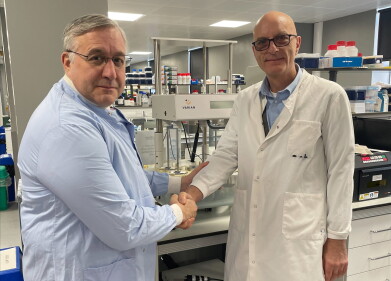News
Lab Expansion Supports Continued Research into Neurological Diseases
Dec 08 2022
Biotech start-up Samsara Therapeutics, an early-stage drug discovery company, has expanded into a further 1,000 ft2 of R&D lab space at The Oxford Trust’s Wood Centre for Innovation in Headington, Oxford’s Health and Life Sciences District to accommodate company growth.
The company, founded in 2018 with operations in Oxford and Boston, USA, was set up with backing from Berlin-based Apollo Ventures, an investor in longevity. They have major collaborations with INSERM and the University of Dundee.
Samsara Therapeutics is working on new therapies for extending healthy ageing and treating age-related and genetic diseases, including Parkinson’s, Amyotrophic Lateral Sclerosis and Charcot-Marie Tooth disease (CMT). They do this by identifying molecules that induce the cellular process of autophagy, which decreases as people age and is dysfunctional in many illnesses.
The company has developed a unique platform, the Lysoseeker™ platform, to identify potent autophagy modulators. Their focus is not just on treatment of disease symptoms but on the underlying cause. Currently there are no autophagy-inducing drugs in the clinic or on the market. Samsara aims to be the first company to introduce such a therapeutic.
Samsara Therapeutics moved into the centre in March 2021 with eight people and has rapidly expanded to 16 people and 2,960 ft2 of lab and office space.
The new CL2 lab space, together with a recent recruitment drive, will allow Samsara Therapeutics to increase the drug discovery and validation capabilities in key neuro disease areas.
Peter Hamley, Chief Scientific Officer at Samsara Therapeutics said: “Taking lab and office space at The Oxford Trust’s Wood Centre for Innovation has allowed us to expand our research and grow organically, which is incredibly valuable for a biotech start-up such as Samsara.
“With this additional space and recruitment of more staff, we are confident that we will make significant progress towards developing disease-modifying therapeutics for patients living with debilitating neurological diseases. There is compelling evidence from human genetics that many diseases are driven by autophagy dysfunction. Samsara Therapeutics’ mission is to discover new mechanisms which can restore autophagy and deploy new drugs to target these mechanisms.”
In addition, Samsara Therapeutics recently announced funding from the CMT Research Foundation (CMT-RF), a US-based not-for-profit focused solely on delivering treatments and cures for Charcot-Marie Tooth disease (CMT). The partnership with Samsara Therapeutics is the charity’s largest investment to date and is focused on optimising their pipeline of autophagy compounds that may eventually become a treatment option for CMT patients.
CMT affects one in 2,500 people and patients suffer from progressive muscle atrophy of legs and arms, causing walking, running and balance problems and abnormal hand and foot functioning.
John K Blackwood, Vice President of Biology, Samsara Therapeutics said: “We have shown that our SAM002-2 series can significantly reduce PMP22 over-expression that causes CMT by stimulating autophagy in axons and Schwann cells restoring neuromuscular impairment and sciatic nerve electrophysiology in preclinical models. The CMT Research Foundation has awarded the grant on this basis.”
Steve Burgess, Chief Executive Officer, The Oxford Trust added: “We are pleased to be able to accelerate lab provision at our Wood Centre for Innovation that provides early-stage companies such as Samsara Therapeutics space and the opportunity to achieve their quest. We wish them continued success.”
Digital Edition
Lab Asia 32.2 April
April 2025
Chromatography Articles - Effects of small deviations in flow rate on GPC/SEC results Mass Spectrometry & Spectroscopy Articles - Waiting for the present to catch up to the future: A bette...
View all digital editions
Events
Apr 09 2025 Tokyo, Japan
Apr 22 2025 Hammamet, Tunisia
Apr 22 2025 Kintex, South Korea
Analytica Anacon India & IndiaLabExpo
Apr 23 2025 Mumbai, India
Apr 23 2025 Moscow, Russia




























